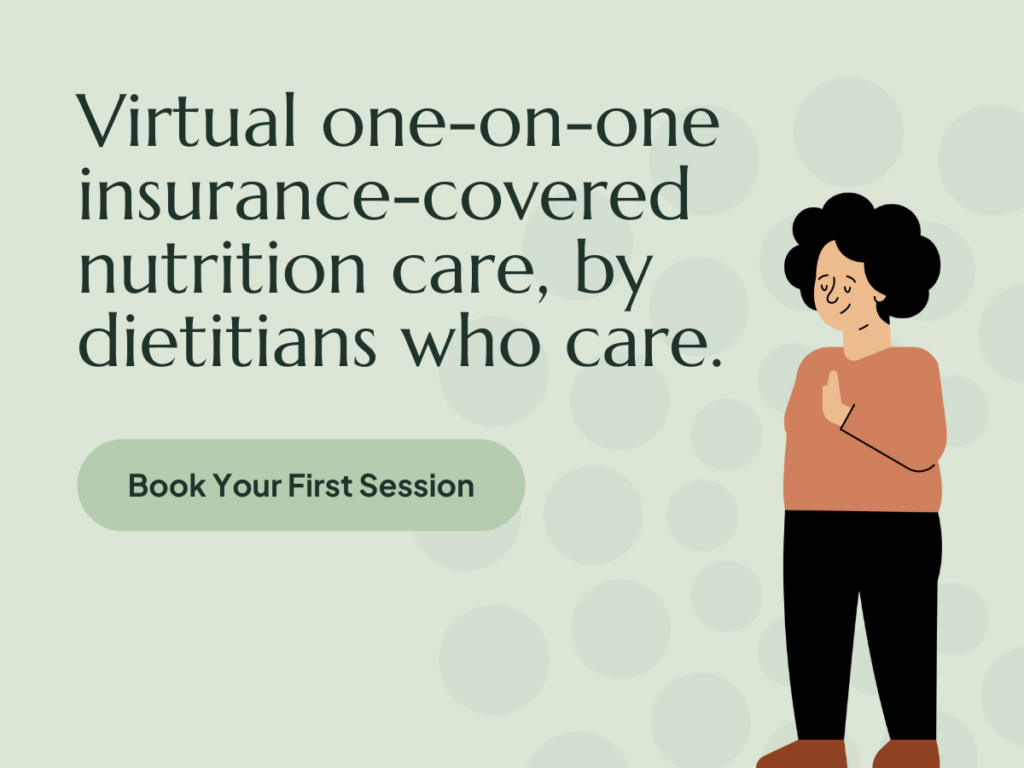Is It Worth Working with a Dietitian for Weight Loss and Management?

Losing weight or maintaining a healthy weight can be an exceptionally tough journey, especially when doing it alone. If you’ve experimented with weight loss diets like keto, Atkins, paleo, and whole 30, only to find them confusing and frustrating, it may be time to consider a different approach. Seeking professional assistance from a registered dietitian is a smart move if your goal is to achieve sustainable, long-term results.
- Registered dietitians offer evidence-based guidance: They provide tailored support, focusing on individualized plans that align with your health and lifestyle needs.
- Collaboration enhances weight loss efforts: Working with a dietitian creates a personalized approach, helping you manage your unique dietary restrictions and health concerns.
- Professional support aids long-term success: Dietitians motivate and educate, ensuring you develop sustainable habits for effective weight management and overall well-being.
Registered dietitians have the qualifications and expertise to provide evidence-based guidance and medical nutrition therapy. They undergo rigorous education and training, specializing in various areas such as eating disorders, women’s health, cardiovascular disease and weight management. Unlike nutritionists, dietitians are certified healthcare providers who can offer comprehensive and trustworthy advice to help you reach your health and weight objectives.
What is a Dietitian for Weight Loss?
A weight loss dietitian is a certified healthcare provider with expertise in offering tailored dietary advice and assistance to individuals striving to attain sustainable weight loss goals for long-term better health outcomes.
Registered dietitian vs nutritionist
Registered Dietitians (RDs) are highly qualified healthcare professionals with extensive nutrition education, over 1,000 hours of clinical training, national licensure through board exams, and ongoing mandatory education. They excel in in-patient and outpatient clinical settings, including hospitals, often collaborating with physicians. In contrast, nutritionists typically earn certificates with fewer educational and clinical requirements, varying by state. Unlike RDs, there is no national standard for education, clinical training, or licensure to use the title “nutritionist.” When comparing registered dietitians vs nutritionists, it’s worth noting that the work of a nutritionist can be valuable. However, their training and clinical experience are typically less intensive than those of Registered Dietitians. This may make them less prepared to provide complex clinical nutrition therapy, particularly for patients dealing with chronic illnesses.
What Does a Dietitian Do for Weight Loss?
A registered dietitian will collaborate directly with you to create a personalized weight loss plan. They design this plan according to your unique requirements, considering factors such as any health conditions, food preferences, and your daily routine.
- Conducts comprehensive nutritional assessments: An RD evaluates your overall health status including your medical history, cultural preferences, eating habits, allergies and intolerances and lifestyle to create a personalized plan that suits your unique needs.
- Develops customized meal plans: Dietitians may create individualized meal plans based on your dietary preference and nutritional needs to ensure you receive the right nutrients while working towards your goals.
- Coordinates individualized nutrition care plan: RDs create a specialized care plan that outlines specific dietary and lifestyle recommendations and strategies to support your weight loss or maintenance efforts, considering health concerns and dietary restrictions you may have.
- Provides nutrition education and coaching: RDs empower you with the knowledge and skills needed for successful weight management. (Read how our RD did this with one of our patients.)
- Offers behavior guidance: RDs help you identify and modify any behaviors that may be contributing to challenges on your journey, providing tools to help you overcome potential unhealthy eating habits.
- Monitors progress: Regular follow-up appointments with an RD allow for ongoing assessment of your progress to help you stay on track towards achieving your goals.
- Provides motivation and support: RDs offer continuous encouragement and motivation to help you stay committed and focused throughout your journey with weight loss and management.

Registered Dietitians and GLP-1 Support
Lately, there has been lots of talk in the media and popular culture surrounding GLP-1s as a tool for rapid weight loss, with many myths and misconceptions swirling around. Let’s learn more about what these are and how they impact your weight loss considerations.
What are GLP-1s?
Drugs like Ozempic, Wegovy, Mounjaro, and Zepbound all belong to a class of medications called GLP-1 Receptor Agonists.
Of those medications, both Ozempic and Mounjaro are FDA approved for the treatment of Type 2 Diabetes—and are often used “off-label” for weight management. Presently, both Wegovy and Zepbound are FDA approved for weight management.
How they work:
- Slow your digestion so you feel full quicker, and for longer.
- Stimulate more insulin production after you eat.
- Decrease rewards signaling in the brain—this means less dopamine related to food/eating, as well as other rewarding activities.
How Your Dietitian Can Support You While on Weight Loss Medications
While weight loss medications can be a useful tool in improving clinical outcomes, there are important nutrition considerations for patients who are on these medications. Working with a registered dietitian in tandem can help you optimize your nutrition and weight both on and off these medications.
“These medications should be included only as an adjunct to a holistic lifestyle change,” says Culina Health’s Jessica Shapiro, RD, CDCES, CDN, who is a certified diabetes care and education specialist, and specializes in weight loss. She also says, “RDs can support a patient’s efforts with a patient-centric, individualized counseling and resources for achieving optimal nutrition intake and supporting improvements in all lifestyle factors that can impact weight loss and quality of life.”
Your RD will also support your journey with weight loss medication by:
- Helping you manage and troubleshoot any side effects that may occur, allowing for better tolerance of therapeutic dose
- Creating a personalized care plan with nutrition and lifestyle recommendations that fit into your life, optimizing your eating pattern to improve your quality of life and support your long-term health
- Preserving your lean body mass and optimizing your micronutrient status
- Providing nutrition education on how dietary patterns and physical activity impact health outcomes outside of weight management
- Monitoring your progress
- Coordinating care with your primary care physician
- Supporting behavior modification to help mitigate weight regain
- Improving your overall relationship with food
If you want to hear directly from our team about Culina Health’s approach to supporting patients on weight loss medication, listen to this episode from our podcast, Easy to Digest: “Weight Loss Drugs: Risks, Benefits, and Real Stories”.
When is GLP-1 not right for you?
GLP-1 receptor agonists may not be suitable for everyone. If you have a history of certain medical conditions, such as pancreatitis or thyroid cancer, or if you have a family history of medullary thyroid carcinoma or multiple endocrine neoplasia syndrome type 2, GLP-1 may pose significant risks. Additionally, individuals with severe gastrointestinal issues or those who are pregnant or planning to become pregnant should avoid these medications. Consult with your healthcare provider and registered dietitian to thoroughly discuss your medical history and potential risks before starting any new weight loss treatment. Personalized advice from medical professionals ensures that your weight loss journey is both safe and effective.
GLP-1 and Eating Disorders
For individuals with a history of eating disorders, the use of weight loss medications may not be advisable, and this decision should be made with careful consideration and in consultation with your healthcare providers.
Weight loss medications can influence appetite and eating behaviors, potentially triggering or exacerbating disordered eating patterns. People who have struggled with conditions such as anorexia, bulimia, or binge eating disorder may experience heightened anxiety around food and weight management while on GLP-1 medications. It’s essential to approach weight loss with a holistic and individualized plan that prioritizes mental health and well-being. Consulting with healthcare providers, including mental health professionals and registered dietitians, can help ensure that weight loss strategies are safe, supportive, and sustainable for those with a history of eating disorders.
Five Benefits of Working With a Dietitian for Weight Loss and Management
- Teach you how to balance meals: Dietitians can educate you on the art of creating nutrient-dense meals that include the right amount of macronutrients (carbohydrates, fats, protein) and essential vitamins and minerals to help you optimize your nutritional intake.
- Offer strategies for mindful eating: Dietitians provide techniques for practicing mindful eating to encourage a healthier relationship with food, reducing overeating and emotional eating.
- Provide support for your weight loss journey: Dietitians offer support to help you navigate challenges and make adjustments as needed for sustainable progress.
- Ensure you meet your nutritional needs: RDs ensure that your dietary plan meets your nutritional needs, taking into account factors like age, blood work, activity level, and any medical conditions. This individualized approach helps prevent nutrient deficiencies.
- Help you set realistic goals: Dietitians assist in setting realistic goals based on your individual needs.
What Else Can Dietitians Do?
Dietitians have a versatile role in promoting health and well-being. They help manage chronic diseases such as diabetes, kidney dysfunction, heart disease, and digestive disorders like celiac disease, providing tailored dietary advice. Dietitians also assist with food allergies and intolerances, design sports nutrition plans, and offer essential guidance during pregnancy and lactation. They address pediatric and geriatric nutrition needs and play a role in supporting mental health through nutrition. In essence, dietitians are well-equipped to support individuals with a wide range of unique nutritional requirements and health concerns.
Using a Dietitian for Weight Loss vs Weight Loss Apps
Exploring weight-loss apps for dietary changes can be a cost-effective and time-efficient option. These apps typically track macronutrients and nutrition details for better dietary understanding. However, sustainable weight loss involves various factors beyond simple calorie counting. Achieving lasting results requires addressing other factors like sleep quality, exercise frequency, lifestyle, and overall health status, including specific medical conditions.
It’s essential to recognize that most diets are often unsustainable due to their restrictiveness and all-or-nothing approach. In fact, 50-80% of patients who lose 10% of body weight regain it after a year, particularly when following a restrictive diet plan.
Some app users may develop an excessive focus on calorie counting and weight tracking, potentially leading to obsessive thoughts or food guilt, so thoughtful consideration is required.
At Culina Health, “Our RDs are so skilled and knowledgeable, they can take into account your likes, dislikes, cultural foods, schedule and other preferences in addition to your medical history and existing dietary restrictions. They can help you set goals that address your personal obstacles. This is what sets us apart from programs like Noom and WW,” says Melissa Alazraki, a Culina Health registered dietitian. Ultimately, for long-lasting results, working with a registered dietitian is often the preferred choice.
How to Choose the Right Dietitian for Weight Loss
To boost your confidence in selecting a dietitian, it’s crucial to be equipped with the right questions. Remember, as the client, your voice and needs are significant in this process, ensuring you feel acknowledged and understood from the outset of your journey. Here are the top questions to ask when seeking the right dietitian.
Questions to ask when seeking a dietitian
- What do you specialize in? Inquire about their areas of expertise, such as weight management, women’s health, diabetes, and sports nutrition, to find a dietitian who aligns with your specific needs and goals.
- What is your approach to nutrition? Understand their nutrition philosophy and approach as it aligns with your beliefs and preferences.
- Do you take a personalized approach? Confirm that they create individualized nutrition plans based on your health status and dietary needs.
- How do you provide support and accountability? Ask about their methods for offering ongoing support and ask how they can help you stay on track.
- How do you stay informed about the latest nutrition research? Determine if they engage in continuing education and stay up to date with the latest nutrition research.
- Do you have experience with my specific goals or health conditions? If you have specific health goals or medical conditions, ask if they have experience working with similar cases.
Cost of hiring a dietitian
As you search for the ideal registered dietitian, you might be wondering, do dietitians accept insurance? At Culina Health, we are affiliated with many major insurance companies, including Aetna, Cigna, and Blue Cross/Blue Shield. When a dietitian is in-network with your insurance company, it often means that your health insurance is likely to cover a significant portion of the expenses. Research has shown that medical nutrition therapy by an RDN over multiple visits led to improved lipids (including cholesterol and triglycerides), weight, HbA1c, and blood pressure, which ultimately leads to cost-effective outcomes and savings on medical expenses.
Let a Dietitian Help You Lose and Maintain Your Weight
Registered Dietitians, especially those at Culina Health, are the ideal choice for achieving and maintaining long-term weight loss and overall well-being. Their tailored advice, deep nutritional knowledge, and focus on individual requirements make them indispensable collaborators in your journey. Furthermore, they’ll be your strongest supporters, aiding you in cultivating sustainable, well-rounded dietary habits that result in enduring success.
Any general advice posted on our blog, website, or application is intended for reference and educational purposes only and is not intended to replace or substitute for any professional medical advice, diagnosis, treatment, or other professional advice. If you have specific concerns or a situation arises in which you require medical advice, you should consult with an appropriately qualified and licensed medical services provider.





